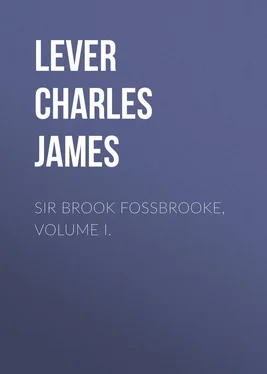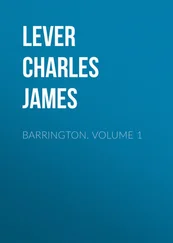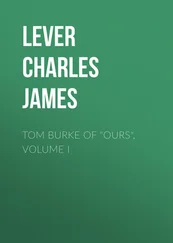Charles Lever - Sir Brook Fossbrooke, Volume I.
Здесь есть возможность читать онлайн «Charles Lever - Sir Brook Fossbrooke, Volume I.» — ознакомительный отрывок электронной книги совершенно бесплатно, а после прочтения отрывка купить полную версию. В некоторых случаях можно слушать аудио, скачать через торрент в формате fb2 и присутствует краткое содержание. Жанр: literature_19, foreign_antique, foreign_prose, на английском языке. Описание произведения, (предисловие) а так же отзывы посетителей доступны на портале библиотеки ЛибКат.
- Название:Sir Brook Fossbrooke, Volume I.
- Автор:
- Жанр:
- Год:неизвестен
- ISBN:нет данных
- Рейтинг книги:3 / 5. Голосов: 1
-
Избранное:Добавить в избранное
- Отзывы:
-
Ваша оценка:
- 60
- 1
- 2
- 3
- 4
- 5
Sir Brook Fossbrooke, Volume I.: краткое содержание, описание и аннотация
Предлагаем к чтению аннотацию, описание, краткое содержание или предисловие (зависит от того, что написал сам автор книги «Sir Brook Fossbrooke, Volume I.»). Если вы не нашли необходимую информацию о книге — напишите в комментариях, мы постараемся отыскать её.
Sir Brook Fossbrooke, Volume I. — читать онлайн ознакомительный отрывок
Ниже представлен текст книги, разбитый по страницам. Система сохранения места последней прочитанной страницы, позволяет с удобством читать онлайн бесплатно книгу «Sir Brook Fossbrooke, Volume I.», без необходимости каждый раз заново искать на чём Вы остановились. Поставьте закладку, и сможете в любой момент перейти на страницу, на которой закончили чтение.
Интервал:
Закладка:
“I see him at the window,” said Beattie; “he is beckoning to me; good-bye,” and he passed on and entered the house.
In the chief drawing-room, in a deep recess of a window, sat the Chief Baron, dressed as if to go out, with an overcoat and even his gloves on. “Come and drive with me, Beattie,” cried he, in a feeble but harsh voice. “If I take my man Leonard, they ‘ll say it was a keeper. You know that the ‘Post’ has it this morning that it is my mind which has given way. They say they ‘ve seen me breaking for years back. Good heavens! can it be possible, think you, that the mites in a cheese speculate over the nature of the man that eats them? You stopped to talk with Pemberton I saw; what did he say to you?”
“Nothing particular, – a mere greeting, I think.”
“No, sir, it was not; he was asking you how many hours there lay between him and the Attorney-Generalship. They ‘ve divided the carcase already. The lion has to assist at his autopsy, – rather hard, is n’t it? How it embitters death, to think of the fellows who are to replace us!”
“Let me feel your pulse.”
“Don’t trust it, Beattie; that little dialogue of yours on the grass plot has sent it up thirty beats; how many is it?”
“Rapid, – very rapid; you need rest, – tranquillity.”
“And you can’t give me either, sir; neither you nor your craft. You are the Augurs of modern civilization, and we cling to your predictions just as our forefathers did, though we never believe you.”
“This is not flattery,” said Beattie, with a slight smile.
The old man closed his eyes, and passed his hand slowly over his forehead. “I suppose I was dreaming, Beattie, just before you came up; but I thought I saw them all in the Hall, talking and laughing over my death. Burrowes was telling how old I must be, because I moved the amendment to Flood in the Irish Parliament in ‘97; and Eames mentioned that I was Curran’s junior in the great Bagenal record; and old Tysdal set them all in a roar by saying he had a vision of me standing at the gate of heaven, and instead of going in, as St. Peter invited me, stoutly refusing, and declaring I would move for a new trial! How like the rascals!”
“Don’t you think you’d be better in your own room? There’s too much light and glare here.”
“Do you think so?”
“I am sure of it. You need quiet, and the absence of all that stimulates the action of the brain.”
“And what do you , sir, – what does any one, – know about the brain’s operations? You doctors have invented a sort of conventional cerebral organ, which, like lunar caustic, is decomposed by light; and in your vulgar materialism you would make out that what affects your brain must act alike upon mine . I tell you, sir, it is darkness – obscurity, physical or moral, it matters not which – that irritates me , just as I feel provoked this moment by this muddling talk of yours about brain.”
“And yet I ‘m talking about what my daily life and habits suggest some knowledge of,” said Beattie, mildly.
“So you are, sir, and the presumption is all on my side. If you’ll kindly lend me your arm, I’ll go back to my room.”
Step by step, slowly and painfully, he returned to his chamber, not uttering a word as he went.
“Yes, this is better, doctor; this half light soothes; it is much pleasanter. One more kindness. I wrote to Lady Lendrick this morning to come up here. I suppose my combative spirit was high in me, and I wanted a round with the gloves, – or, indeed, without them; at all events, I sent the challenge. But now , doctor, I have to own myself a craven. I dread the visit Could you manage to interpose? Could you suggest that it is by your order I am not permitted to receive her? Could you hint” – here he smiled half maliciously – “that you do not think the time has come for anodynes, – eh, doctor?”
“Leave it to me. I ‘ll speak to Lady Lendrick.”
“There ‘s another thing: not that it much matters; but it might perhaps be as well to send a few lines to the morning papers, to say the accounts of the Chief Baron are more favorable to-day; he passed a tranquil night, and so on. Pemberton won’t like it, nor Hayes; but it will calm the fears of a very attached friend who calls here twice daily. You’d never guess him. He is the agent of the Globe Office, where I ‘m insured. Ah, doctor, it was a bright thought of Philanthropy to establish an industrial enterprise that is bound, under heavy recognizances, to be grieved at our death.”
“I must not make you talk, Sir William. I must not encourage you to exert yourself. I ‘ll say good-bye, and look in upon you this afternoon.”
“Am I to have a book? Well; be it so. I I ‘ll sit and muse over the Attorney-General and his hopes.”
“I have got two very interesting miniatures here. I ‘ll leave them with you; you might like to look at them.”
“Miniatures! whose portraits are they?” asked the other, hastily, as he almost snatched them from his hand. “What a miserable juggler! what a stale trick this!” said he, as he opened the case which contained the young man’s picture. “So, sir, you lend yourself to such attempts as these.”
“I don’t understand you,” said Beattie, indignantly.
“Yes, sir, you understand me perfectly. You would do, by a piece of legerdemain, what you have not the courage to attempt openly. These are Tom Lendrick’s children.”
“They are.”
“And this simpering young lady is her mother’s image; pretty, pretty, no doubt; and a little – a shade, perhaps – of espièglerie above what her mother possessed. She was the silliest woman that ever turned a fool’s head. She had the ineffable folly, sir, to believe she could persuade me to forgive my son for having married her; and when I handed her to a seat, – for she was at my knees, – she fainted.”
“Well. It is time to forgive him now. As for her, she is beyond forgiveness, or favor, either,” said Beattie, with more energy than before.
“There is no such trial to a man in a high calling as the temptation it offers him to step beyond it. Take care, sir, that with all your acknowledged ability, this temptation be not too much for you.” The tone and manner in which the old judge delivered these words recalled the justice-seat. “It is an honor to me to have you as my doctor, sir. It would be to disparage my own intelligence to accept you as my confessor.”
“A doctor but discharges half his trust when he fails to warn his patient against the effects of irritability.”
“The man who would presume to minister to my temper or to my nature should be no longer medico of mine. With what intention, sir, did you bring me these miniatures?”
“That you might see two bright and beautiful faces whose owners are bound to you by the strongest ties of blood.”
“Do you know, sir, – have you ever heard, – how their father, by his wilfulness, by his folly, by his heartless denial of my right to influence him, ruined the fortune that cost my life of struggle and labor to create?”
The doctor shook his head, and the other continued: “Then I will tell it to you, sir. It is more than seventeen years to-day when the then Viceroy sent for me, and said, ‘Baron Lendrick, there is no man, after Plunkett, to whom we owe more than to yourself.’ I bowed, and said, ‘I do not accept the qualification, my Lord, even in favor of the distinguished Chancellor. I will not believe myself second to any.’ I need not relate what ensued; the discussion was a long one, – it was also a warm one; but he came back at last to the object of the interview, which was to say that the Prime Minister was willing to recommend my name to her Majesty for the Peerage, – an honor, he was pleased to say, the public would see conferred upon me with approval; and I refused! Yes, sir, I refused what for thirty-odd years had formed the pride and the prize of my existence! I refused it, because I would not that her Majesty’s favor should descend to one so unworthy of it as this fellow, or that his low-born children should inherit a high name of my procuring. I refused, sir, and I told the noble Marquess my reasons. He tried – pretty much as you have tried – to bring me to a more forgiving spirit; but I stopped him by saying, ‘When I hear that your Excellency has invited to your table the scurrilous author of the lampoon against you in the “Satirist,” I will begin to listen to the claims that may be urged on the score of forgiveness; not till then.’”
Читать дальшеИнтервал:
Закладка:
Похожие книги на «Sir Brook Fossbrooke, Volume I.»
Представляем Вашему вниманию похожие книги на «Sir Brook Fossbrooke, Volume I.» списком для выбора. Мы отобрали схожую по названию и смыслу литературу в надежде предоставить читателям больше вариантов отыскать новые, интересные, ещё непрочитанные произведения.
Обсуждение, отзывы о книге «Sir Brook Fossbrooke, Volume I.» и просто собственные мнения читателей. Оставьте ваши комментарии, напишите, что Вы думаете о произведении, его смысле или главных героях. Укажите что конкретно понравилось, а что нет, и почему Вы так считаете.












